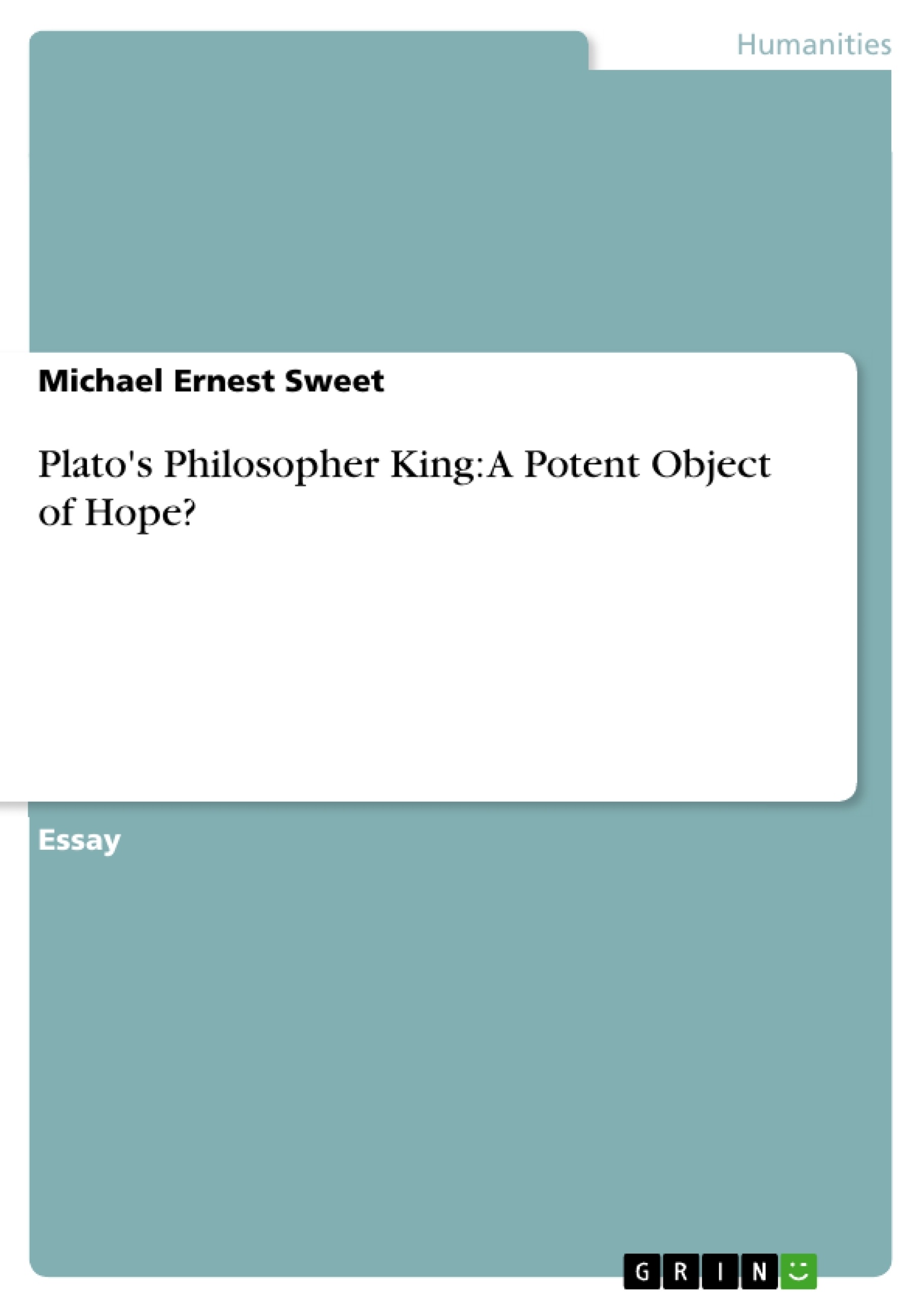In this essay, Michael Ernest Sweet examines the concept of Plato's philosopher-king as found in "The Republic". Is the concept a paradox and a pragmatic impossibility, or is the concept a rhetorical device and a potent object of hope on the quest to uncover the meaning of justice? Perhaps Plato's aim in constructing such a paradox is to show us the impossibility of the perfect political regime?
Table of Contents
- I. Introduction
- II. The Philosopher King
- III. The Paradox
- IV. Contra Paradox
- V. In Support of the Paradox
Objectives and Key Themes
This work aims to explore a philosophical paradox and its implications. It investigates the nature of the paradox, presents counterarguments, and ultimately offers support for the initial paradox.
- The nature of philosophical paradoxes
- The concept of the Philosopher King
- The structure and resolution of logical contradictions
- Arguments for and against a specific philosophical position
- The implications of accepting a paradoxical statement
Chapter Summaries
I. Introduction: This introductory chapter likely lays the groundwork for the subsequent exploration of the philosophical paradox. It may establish the context, define key terms, and introduce the central problem that will be examined throughout the work. The introduction will likely highlight the importance of understanding this specific paradox and provide a roadmap for the arguments to come, preparing the reader for the complexities ahead.
II. The Philosopher King: This chapter likely delves into the concept of the "Philosopher King," a crucial element in understanding the central paradox. The chapter would likely explore the philosophical underpinnings of this concept, perhaps tracing its historical origins and examining various interpretations. It will analyze how the characteristics and role of the Philosopher King directly relate to the central paradox, setting the stage for subsequent analyses of the paradox itself.
III. The Paradox: This chapter presents the main paradox that forms the core of the work. It details the components of the paradox, clearly articulating the contradictory elements involved. This section will likely provide examples and scenarios to illustrate the nature of the paradox and highlight the challenges it presents to conventional thinking. The author will likely dissect the statement of the paradox to show its inherent contradictory elements.
IV. Contra Paradox: This chapter addresses counterarguments and objections to the paradox presented in the previous chapter. It systematically evaluates these opposing viewpoints, analyzing their strengths and weaknesses. This section is crucial for demonstrating a nuanced and comprehensive understanding of the philosophical issues at hand. It provides a balanced perspective by presenting a critical examination of competing ideas before ultimately returning to the support of the initial paradox in the next chapter.
V. In Support of the Paradox: This chapter presents arguments in favor of the central paradox. Building upon the analysis of counterarguments from the previous chapter, this section will offer reasons to support the initial paradox. It will likely involve a careful examination of the philosophical implications of accepting the paradox, demonstrating its coherence or logical consistency despite its apparently contradictory nature. The author will synthesize the preceding chapters, showing how the paradox’s validity withstands critical scrutiny.
Keywords
Philosophical paradox, Philosopher King, logical contradiction, argumentation, philosophical implications, critical analysis.
Frequently Asked Questions: A Comprehensive Language Preview
What is the main topic of this work?
This work centers on a philosophical paradox and its implications. It explores the paradox's nature, examines counterarguments, and ultimately supports the initial paradoxical statement.
What are the key themes explored in this work?
The key themes include the nature of philosophical paradoxes, the concept of the Philosopher King, resolving logical contradictions, arguments for and against a specific philosophical position, and the implications of accepting a paradoxical statement.
What is the structure of the work?
The work is structured into five chapters: An introduction setting the stage; a chapter dedicated to the concept of the Philosopher King; a chapter presenting the central paradox; a chapter addressing counterarguments; and a final chapter supporting the initial paradox.
What is the role of the "Philosopher King" in this work?
The "Philosopher King" is a crucial concept integral to understanding the central paradox. The work explores its philosophical underpinnings, historical origins, and various interpretations, analyzing its relation to the paradox itself.
How does the work handle counterarguments to the paradox?
A dedicated chapter systematically evaluates counterarguments and objections to the paradox. It analyzes the strengths and weaknesses of opposing viewpoints, providing a balanced perspective before ultimately supporting the initial paradox.
What is the conclusion of the work?
The work concludes by presenting arguments in favor of the central paradox, demonstrating its coherence and logical consistency despite its seemingly contradictory nature. It synthesizes previous chapters to show how the paradox withstands critical scrutiny.
What are the keywords associated with this work?
The keywords include: Philosophical paradox, Philosopher King, logical contradiction, argumentation, philosophical implications, and critical analysis.
What is included in the preview?
This preview offers a comprehensive overview, including the title, table of contents, objectives and key themes, chapter summaries, and keywords.
What is the intended audience for this work?
The intended audience appears to be academic, given the focus on structured analysis of philosophical themes.
Where can I find more information about this work?
Further information would require accessing the full text of the work itself.
- Quote paper
- Michael Ernest Sweet (Author), 2016, Plato's Philosopher King: A Potent Object of Hope?, Munich, GRIN Verlag, https://www.grin.com/document/337650




